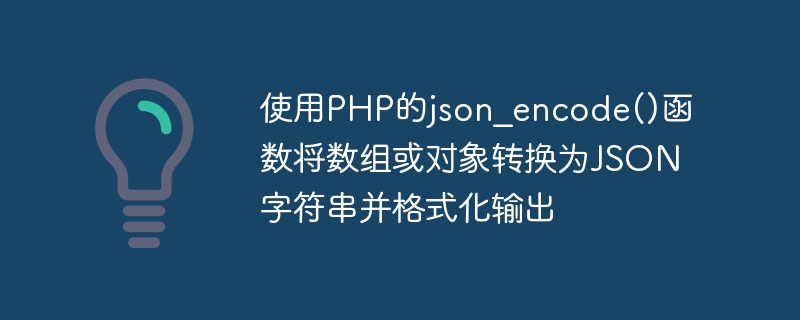Home >Backend Development >PHP Tutorial >Use PHP's json_encode() function to convert an array or object into a JSON string and format the output
Use PHP's json_encode() function to convert an array or object into a JSON string and format the output
- WBOYWBOYWBOYWBOYWBOYWBOYWBOYWBOYWBOYWBOYWBOYWBOYWBOriginal
- 2023-11-03 15:44:162078browse

Use PHP's json_encode() function to convert an array or object into a JSON string and format the output, which makes it easy to transfer and exchange data between different platforms and languages. much easier. This article will introduce the basic usage of the json_encode() function and how to format and output a JSON string.
1. Basic usage of json_encode() function
The basic syntax of json_encode() function is as follows:
string json_encode ( mixed $value [, int $options = 0 [, int $depth = 512 ]] )
Among them, $value is the value to be encoded in JSON format, Can be an array, object, or other type of variable. $options are optional parameters used to specify encoding options, such as specifying the data format, encoding method, indentation, etc. $depth is also an optional parameter, used to specify the recursion depth.
The following code example demonstrates how to use the json_encode() function to convert arrays and objects into JSON strings:
// 将数组转换为JSON字符串
$arr = array('one' => 1, 'two' => 2, 'three' => 3);
$json = json_encode($arr);
echo $json; // 输出:{"one":1,"two":2,"three":3}
// 将对象转换为JSON字符串
$obj = new stdClass();
$obj->name = 'John';
$obj->age = 30;
$obj->country = 'USA';
$json = json_encode($obj);
echo $json; // 输出:{"name":"John","age":30,"country":"USA"}2. Use the json_encode() function to format and output JSON strings
If you use the JSON string output by the json_encode() function directly, it is usually a compact line of text, which is not convenient for viewing and debugging. You can use some techniques to format the output of JSON strings, such as using the JSON_PRETTY_PRINT option, manually adding indented spaces, etc.
The following code example demonstrates how to use the JSON_PRETTY_PRINT option to format a JSON string for output:
// 使用JSON_PRETTY_PRINT选项格式化输出
$arr = array('one' => 1, 'two' => 2, 'three' => 3);
$json = json_encode($arr, JSON_PRETTY_PRINT);
echo $json;
// 输出:
/*
{
"one": 1,
"two": 2,
"three": 3
}
*/In addition to using the JSON_PRETTY_PRINT option, you can also manually add indent spaces to format the output. For example:
// 手动添加缩进空格格式化输出
$arr = array('one' => 1, 'two' => 2, 'three' => 3);
$json = json_encode($arr);
$pretty_json = str_replace(array("{", "}", ","), array("{
", "
}", ",
"), $json);
echo $pretty_json;
// 输出:
/*
{
"one": 1,
"two": 2,
"three": 3
}
*/3. Summary
Use PHP's json_encode() function to convert an array or object into a JSON string and format the output, which can facilitate data exchange and transfer. It should be noted that when dealing with special cases such as Chinese characters, appropriate encoding methods and options need to be used.
The above is the detailed content of Use PHP's json_encode() function to convert an array or object into a JSON string and format the output. For more information, please follow other related articles on the PHP Chinese website!

